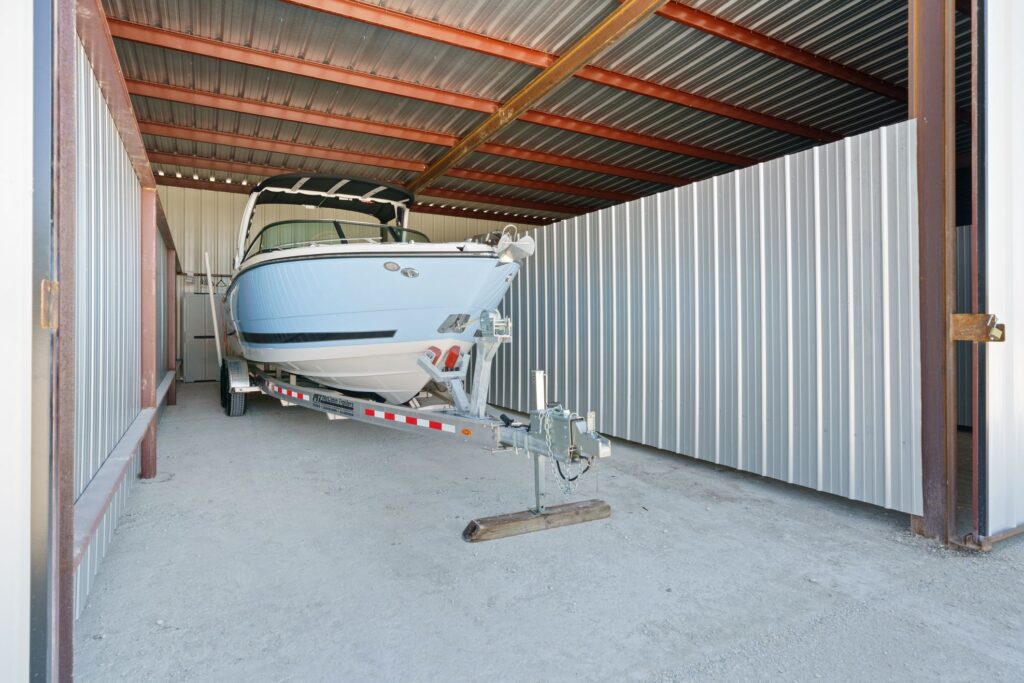When it comes to storing your boat, proper care extends beyond just the hull and engine. The boat’s battery also requires attention, especially if you’re preparing for off-season storage. Neglecting your battery can lead to costly replacements and inconvenient issues down the road. This guide covers some best practices for boat storage, focusing specifically on battery care. While these tips can help prolong battery life, they don’t guarantee perfect results, as many factors can influence outcomes.

Importance of Battery Storage for Boat Storage
Boat owners often focus on the physical structure of their boat when preparing for storage, but the battery is equally crucial. A boat’s battery powers essential systems, and improper care during storage could affect its ability to function correctly once you’re back on the water. This is why understanding battery storage best practices is important. Following these practices could help extend battery life and ensure your boat is ready for use when needed.
Steps to Prepare the Battery for Boat Storage
1. Clean the Battery
Before storing your boat’s battery, it’s helpful to clean it. Dirt, grime, and corrosion can accumulate on the battery terminals and surface over time. Using a mixture of baking soda and water, you can clean off any debris. A clean battery helps ensure a better connection between the terminals and the cables, which could improve performance later. Remember to rinse the battery with clean water and allow it to dry thoroughly before storage.
2. Disconnect the Battery
Always disconnect the battery before storing your boat for an extended period. Even if the boat is turned off, there may still be some systems drawing power, such as navigation lights or alarms. Disconnecting the battery reduces the risk of accidental discharge. It’s often best to remove the battery entirely and store it in a safe, dry location to minimize risks during storage.
Ideal Storage Conditions for Boat Battery Storage
1. Cool, Dry Environment
The environment in which you store your boat battery matters. A cool, dry space helps preserve the battery’s condition. High temperatures can accelerate the battery’s discharge rate and degrade the internal components. On the other hand, extremely cold temperatures can cause a battery to freeze, especially if it isn’t fully charged. Therefore, storing it in a stable environment with controlled temperatures can reduce wear and tear.
2. Use a Battery Tray
If you are storing your battery in your garage or storage unit, consider placing it in a battery tray. A battery tray can provide extra protection in case of leaks and prevent corrosion from spreading to other surfaces. Additionally, the tray can make it easier to handle and transport the battery when needed.
Call us NOW to secure your boat in Mason City RV and Boat Storage. We’ve literally got you covered!
Charging Tips During Boat Storage
1. Keep the Battery Charged
One of the most important factors in boat storage is ensuring the battery remains charged. Over time, a battery naturally loses its charge. Regularly charging the battery can prevent it from becoming completely drained, which could reduce its overall lifespan. Some boat owners opt for a trickle charger, which provides a low level of charge over time to keep the battery topped off. These devices can be especially useful if the boat is in long-term storage.
2. Avoid Overcharging
While keeping the battery charged is important, it’s equally important not to overcharge it. Overcharging can cause heat buildup, leading to internal damage. Modern chargers often come with a feature to automatically stop charging when the battery is full. However, it’s always best to monitor the battery’s charge to avoid potential issues.
Safety Precautions for Boat Battery Storage
1. Handle With Care
When removing and handling your boat battery, always take necessary precautions. Batteries contain sulfuric acid, which is highly corrosive. Using gloves and safety goggles can help reduce the risk of injury while handling. Ensure you avoid direct contact with the battery’s terminals and store it away from flammable materials.
2. Inspect the Battery Regularly
Even during storage, it’s good practice to check on your boat battery periodically. Look for signs of corrosion, leaks, or other potential issues. Regular inspections help catch problems early, potentially preventing larger issues later on. If you notice any significant damage, it may be a good idea to replace the battery rather than risk it malfunctioning.

Reinstalling the Battery After Boat Storage
1. Check the Charge Before Reinstallation
Before reinstalling the battery after storage, make sure it’s fully charged. A partially charged battery could struggle to power your boat’s systems, leading to complications once you’re back on the water. Use a battery tester or voltmeter to check the charge. Aim for a voltage of around 12.4 to 12.7 volts before reinstalling.
2. Reconnect Safely
When reconnecting the battery, start by connecting the positive terminal first, followed by the negative terminal. This reduces the risk of sparks. Ensure that the terminals are clean and the connections are tight to avoid power loss during use. Double-check all connections to make sure they’re secure before starting the boat.
Additional Tips for Boat Battery Storage
1. Consider a Battery Maintainer
A battery maintainer is a helpful tool to use during boat storage. It helps regulate the battery’s charge without overcharging it. Unlike a standard charger, a battery maintainer monitors the battery’s voltage and adjusts the charge as needed. This could help prolong the battery’s lifespan while your boat is in storage.
2. Test the Battery Before Use
Once your boat is ready to come out of storage, test the battery before hitting the water. A simple test can reveal if the battery is still in good condition or if it requires replacement. Testing also helps catch any potential issues early, preventing surprises during your next boating trip.
Conclusion
Proper battery storage plays a key role in boat maintenance. By following these best practices, you can potentially extend the life of your boat’s battery and reduce the risk of issues when it’s time to take your boat out again. While no method guarantees perfect results, these steps can help preserve the battery’s condition throughout the off-season. Keep your boat battery in good shape to ensure smooth sailing next season!
Do you want to ensure your boat stays safe and well-maintained while you’re away? Reach out to us HERE to learn more about our boat storage options in Mason City, Iowa, and secure your spot today!
Disclaimer:
The information provided is intended for educational purposes only and should not be taken as advice nor are there guarantees of any kind.


